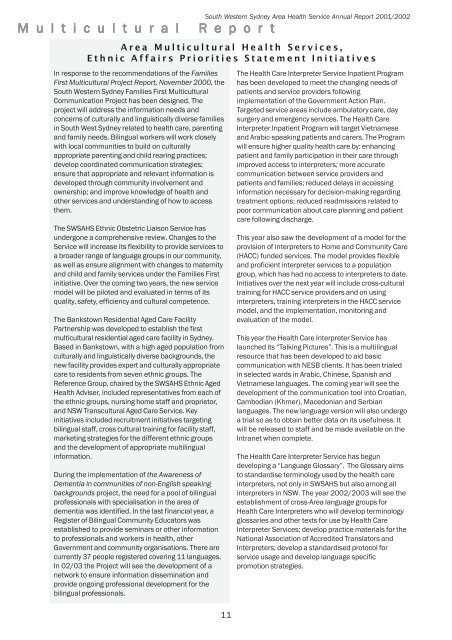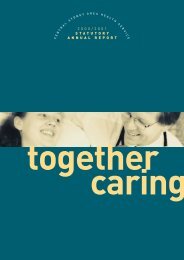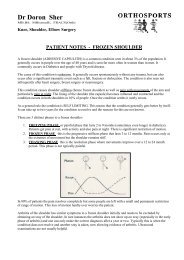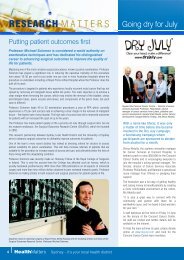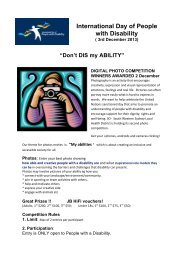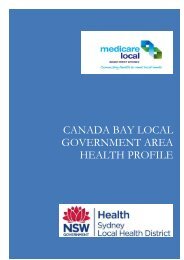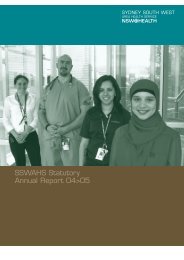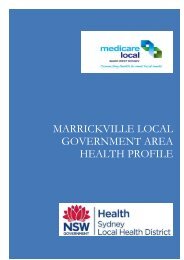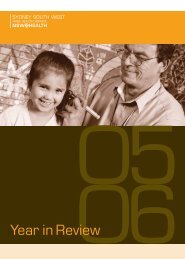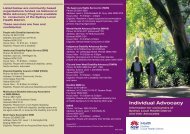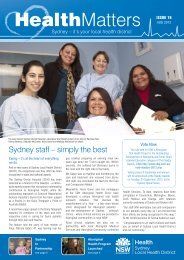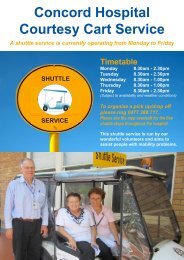2001-02 Annual Report - Sydney Local Health District - NSW ...
2001-02 Annual Report - Sydney Local Health District - NSW ...
2001-02 Annual Report - Sydney Local Health District - NSW ...
You also want an ePaper? Increase the reach of your titles
YUMPU automatically turns print PDFs into web optimized ePapers that Google loves.
M u l t i c u l t u r a l R e p o r tIn response to the recommendations of the FamiliesFirst Multicultural Project <strong>Report</strong>, November 2000, theSouth Western <strong>Sydney</strong> Families First MulticulturalCommunication Project has been designed. Theproject will address the information needs andconcerns of culturally and linguistically diverse familiesin South West <strong>Sydney</strong> related to health care, parentingand family needs. Bilingual workers will work closelywith local communities to build on culturallyappropriate parenting and child rearing practices;develop coordinated communication strategies;ensure that appropriate and relevant information isdeveloped through community involvement andownership; and improve knowledge of health andother services and understanding of how to accessthem.The SWSAHS Ethnic Obstetric Liaison Service hasundergone a comprehensive review. Changes to theService will increase its flexibility to provide services toa broader range of language groups in our community,as well as ensure alignment with changes to maternityand child and family services under the Families Firstinitiative. Over the coming two years, the new servicemodel will be piloted and evaluated in terms of itsquality, safety, efficiency and cultural competence.The Bankstown Residential Aged Care FacilityPartnership was developed to establish the firstmulticultural residential aged care facility in <strong>Sydney</strong>.Based in Bankstown, with a high aged population fromculturally and linguistically diverse backgrounds, thenew facility provides expert and culturally appropriatecare to residents from seven ethnic groups. TheReference Group, chaired by the SWSAHS Ethnic Aged<strong>Health</strong> Adviser, included representatives from each ofthe ethnic groups, nursing home staff and proprietor,and <strong>NSW</strong> Transcultural Aged Care Service. Keyinitiatives included recruitment initiatives targetingbilingual staff, cross cultural training for facility staff,marketing strategies for the different ethnic groupsand the development of appropriate multilingualinformation.During the implementation of the Awareness ofDementia in communities of non-English speakingbackgrounds project, the need for a pool of bilingualprofessionals with specialisation in the area ofdementia was identified. In the last financial year, aRegister of Bilingual Community Educators wasestablished to provide seminars or other informationto professionals and workers in health, otherGovernment and community organisations. There arecurrently 37 people registered covering 11 languages.In <strong>02</strong>/03 the Project will see the development of anetwork to ensure information dissemination andprovide ongoing professional development for thebilingual professionals.South Western <strong>Sydney</strong> Area <strong>Health</strong> Service <strong>Annual</strong> <strong>Report</strong> <strong>2001</strong>/20<strong>02</strong>Area Multicultural <strong>Health</strong> Services,Ethnic Affairs Priorities Statement Initiatives11The <strong>Health</strong> Care Interpreter Service Inpatient Programhas been developed to meet the changing needs ofpatients and service providers followingimplementation of the Government Action Plan.Targeted service areas include ambulatory care, daysurgery and emergency services. The <strong>Health</strong> CareInterpreter Inpatient Program will target Vietnameseand Arabic-speaking patients and carers. The Programwill ensure higher quality health care by: enhancingpatient and family participation in their care throughimproved access to interpreters; more accuratecommunication between service providers andpatients and families; reduced delays in accessinginformation necessary for decision-making regardingtreatment options; reduced readmissions related topoor communication about care planning and patientcare following discharge.This year also saw the development of a model for theprovision of interpreters to Home and Community Care(HACC) funded services. The model provides flexibleand proficient interpreter services to a populationgroup, which has had no access to interpreters to date.Initiatives over the next year will include cross-culturaltraining for HACC service providers and on usinginterpreters, training interpreters in the HACC servicemodel, and the implementation, monitoring andevaluation of the model.This year the <strong>Health</strong> Care Interpreter Service haslaunched its “Talking Pictures”. This is a multilingualresource that has been developed to aid basiccommunication with NESB clients. It has been trialedin selected wards in Arabic, Chinese, Spanish andVietnamese languages. The coming year will see thedevelopment of the communication tool into Croatian,Cambodian (Khmer), Macedonian and Serbianlanguages. The new language version will also undergoa trial so as to obtain better data on its usefulness. Itwill be released to staff and be made available on theIntranet when complete.The <strong>Health</strong> Care Interpreter Service has begundeveloping a “Language Glossary”. The Glossary aimsto standardise terminology used by the health careinterpreters, not only in SWSAHS but also among allinterpreters in <strong>NSW</strong>. The year 20<strong>02</strong>/2003 will see theestablishment of cross-Area language groups for<strong>Health</strong> Care Interpreters who will develop terminologyglossaries and other texts for use by <strong>Health</strong> CareInterpreter Services; develop practice materials for theNational Association of Accredited Translators andInterpreters; develop a standardised protocol forservice usage and develop language specificpromotion strategies.


